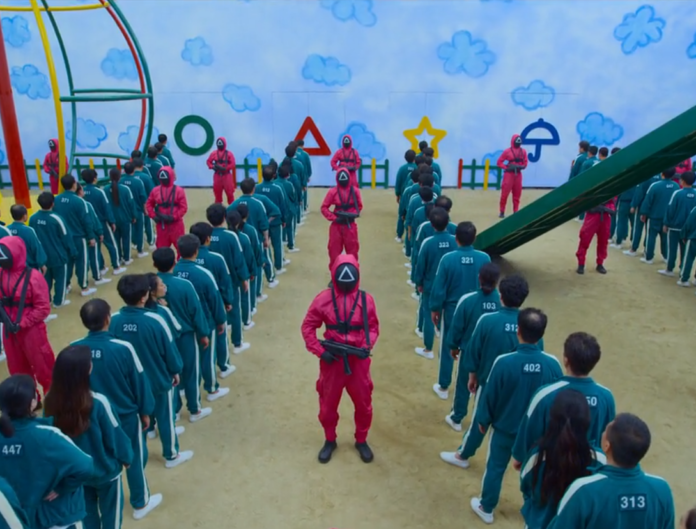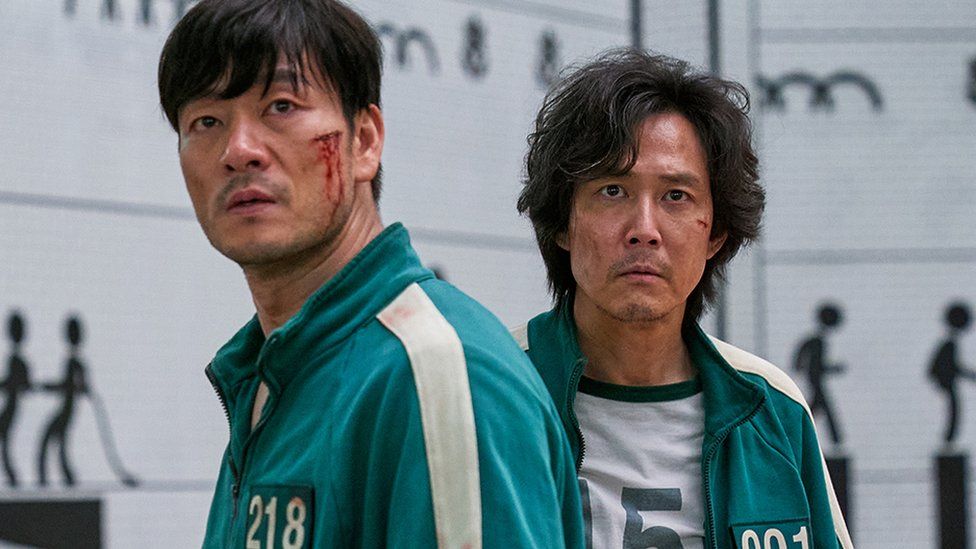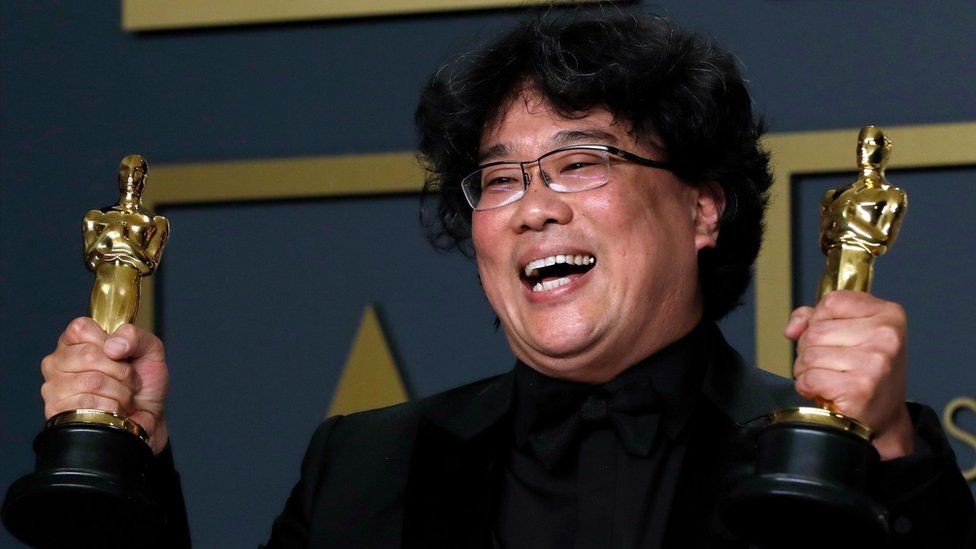GENERAL NEWS
SQUID GAME:The rise of Korean drama addiction

If watching Squid Game means the prospect of playing red light, green light now fills you with nerve-shredding terror rather than fond childhood memories, you aren’t alone.
The Korean thriller, which tells the story of debt-ridden people competing for a huge cash prize in a deadly series of children’s games, has become Netflix’s biggest ever series launch – streamed by 111 million users in its first 28 days.
In doing so it knocked Bridgerton off the top spot, making clear that Korean dramas – K-dramas for short – have most certainly been given the green light by audiences worldwide.
So, how can we understand this rise, and what are some of the other K-dramas to look out for if you’re a new convert?

Squid Game’s breakthrough popularity marks the latest wave in a Korean culture tsunami that’s built throughout the West in recent years.
The show joins K-pop artists such as BTS and Blackpink, who have become household names in music, and films like Parasite and Minari, which achieved Hollywood recognition and Oscars success.
But the K-drama takeover is far from the overnight sensation it may first seem.
Although they’ve only recently gripped worldwide audiences, K-dramas have been popular in Asia for decades.
Increasing liberalisation throughout the country in the 90s saw huge amounts of money poured into the entertainment industry. As Japan battled economic decline and China rose, South Korean culture pounced – offering TV that was both more relatable than US shows and morally palatable to Beijing.

Over the next decade it challenged Japanese might to become a new purveyor of Asian cool, with 20% of viewers in Japan watching 2003 drama Winter Sonata.
A 2011 report by the Korean Culture and Information Service concluded: “In many Asian cities, Korean dramas seem to be influencing lifestyles and consumer behaviour, which speaks to their cultural appeal.”
Parasite’s success
Global interest grew as streaming services like Viki and DramaFever made it possible for viewers to legally watch Korean content online with English subtitles, opening K-dramas up to a new audience over the past decade.
As their grassroots popularity increased, so did distribution deals with Western streaming upstarts Hulu and Netflix. When Warner Bros shut DramaFever in 2018, Netflix began further investment.
Slowly over the next two years, a growing number of subscribers would become hooked on K-dramas, drawn into the varied storylines and comforting escapism.
The word-of-mouth success of 2019 romantic drama Crash Landing on You – which stayed in the top 10 in Japan for 229 days and was the sixth most-watched show on Netflix in the US between March 21 and March 27, 2020 – coincided with the big-screen success of Parasite to spark new-found levels of interest.

Then the pandemic happened, and with the Western entertainment industry (literally) shuttered down, K-drama fever truly hit. Netflix revealed that viewing of Korean content across Asia increased fourfold in 2020 compared with 2019.
London-based writer and K-drama fanatic Taylor-Dior Rumble explains: “Most popular K-dramas are typically ultra stylised, glossy and quite removed from reality, which is why they’re such a great form of escapism.
“After such a bleak few years, people are gravitating more towards heart-warming forms of entertainment,” she says.
There is a “wide range of shows containing plenty of unique ideas and unexpected storylines that you’d probably never get from a British or American channel”, which range from fantasy and sci-fi to action and thriller, Rumble says.
This broad appeal is helped by the family-friendly tone. “There’s practically no nudity or sex,” adds Rumble. “Korean society is quite conservative so this means a lot of their shows hold cross-culture appeal.”
Add in high-end production values and stunning locations, and Rumble says the dramas offer “a rich and pleasurable viewing experience that you simply don’t get enough of anywhere else”.
K-dramas also reflect worldwide social stresses that resonate with many younger generations.
“As the wealth gap between the rich and poor continues to widen and other inequalities continue to increase, Parasite’s frank exposure of the extremes in Korea resonated with so many people” says Rumble.
Squid Game, she feels, is similarly pointed beneath its bloodied popcorn exterior.
“It tackled a lot of situations, such as debt and the pressures of providing, which was probably somewhat relatable to a world still recovering from a pandemic that has been incredibly difficult for a lot of people.”
GENERAL NEWS
DEBUT ALBUM: Miriam Mandipira & The Soul Family
DEBUT ALBUM by Miriam Mandipira & The Soul Family!
You’ve never heard a voice like Miriam Mandipira’s. Undeservedly, she doesn’t take credit for the power or presence she delivers. For Miriam, music is much more than just notes and words. It’s
magic. And faith. You can experience it LIVE and on the album, which is set to be released on September 1st.
She has been singing for as long as she can remember, growing up with her ears glued to the radio.
From the moment her school teacher asked her to sing in class, the rest has been history. From Africa to Denmark, from Book Café in Harare to Mojo Blues Bar and the big concert halls. From
Danish Radio Big Band to the Royal Theater. Music is music, and Miriam is the music.
“But it’s not about me when I sing. I’m just the instrument, and when I’m on stage with my band, I sing from a place that’s not about rules and technique but about emotions,” says the singer, who is
seriously trying her hand at songwriting – together with her Soul Family on the album “Ndiwe”, which means ‘you are the chosen one of my heart.’ The overall message is impossible to ignore
Love.
“Call me a soul singer, call me a jazz singer. I don’t care. Good music is good music, and I love interpreting other people’s songs and being inspired. At the same time, I think it’s great to try my
hand at creating and writing the songs myself – and with my friends in the Soul Family, I have found my place. They are my family, and the curiosity and respect we share are fantastic.”
You can experience that up close when Miriam & The Soul Family take the stage. The enthusiasm for music and communication is impossible to ignore and hear.
“I love to maintain the feeling of being a child. It’s an excitement and curiosity that keeps me going, and that’s why I’m so excited about every single concert – no matter how small or large it is.
Otherwise, I would never do it. This is not just a casual thing. This is a life, and everything means something,” says Miriam, who began her years in Denmark by jamming at Mojo Blues Bar, building a network.
Enjoy
ENTERTAINMENT
Bnoskka and Apprise Music Join Forces To Launch IP Zone Podcast

Bnoskka, a leading creative arts business and intellectual property consultant, is excited to announce its collaboration with Apprise Music, a renowned music publishing and distribution company, to launch the IP Zone Podcast. Hosted by Bnoskka, the podcast is now streaming on YouTube, Spotify and all major streaming platforms.
IP Zone Podcast delves into the fascinating world of intellectual property, creativity, and innovation, featuring insightful conversations with industry experts, artists, and thought leaders. With a focus on the music and creative industries, the podcast explores the latest trends, challenges, and opportunities in intellectual property, copyright, and innovation.

“I am thrilled to partner with Apprise Music to bring IP Zone Podcast to the public,” said Bnoskka. “Our goal is to create an engaging and informative platform that sparks meaningful discussions and inspires creativity. We believe that intellectual property is at the heart of innovation, and we’re excited to share this journey with our audience.”

“Apprise Music is dedicated to empowering creatives and artists to protect and monetize their intellectual property,” said Mr. Michael Bamfo, CEO of Apprise Music. “We’re proud to collaborate with Bnoskka on IP Zone Podcast, and we look forward to sharing our expertise and insights with the creative community.”
Tune in to IP Zone Podcast on YouTube, Spotify, Apple Podcasts, Google Podcasts, and other popular streaming platforms.
Subscribe now and join the conversations.
Contact:
Mr. Michael Bamfo
Email: [email protected]
Phone: +233 24 502 4002
About Bnoskka:
Bnoskka is a creative arts business and intellectual property consultant dedicated to empowering creatives and businesses to protect, monetize, and grow their intellectual property.
About Apprise Music:
Apprise Music is a music publishing and distribution company committed to supporting artists and creatives in the music industry.
-

 MUSIC4 weeks ago
MUSIC4 weeks agoJoseph Matthew Scoops Three Prestigious Nominations at Taabea Ghana Music Awards UK 2024
-

 EDUCATION1 week ago
EDUCATION1 week agoKwegyir Aggrey Senior High Technical School Alumni Set to Make History with Inaugural Reunio
-

 MUSIC5 days ago
MUSIC5 days agoApostle Eric Deh – Melodies Of Restoration EP
-

 MUSIC2 weeks ago
MUSIC2 weeks agoApostle Eric Deh Set To Release “Melodies Of Restoration” EP
-

 Lifestyle7 days ago
Lifestyle7 days agoKae Wakyi Rich Limited Is Set To Be Launched On Saturday,12th October
-

 MUSIC7 days ago
MUSIC7 days agoYeaboi Recruits Strongman On A New Song ‘Adaka’
-

 MUSIC2 days ago
MUSIC2 days agoJay Winning Secures International Collaboration With UK Artiste



